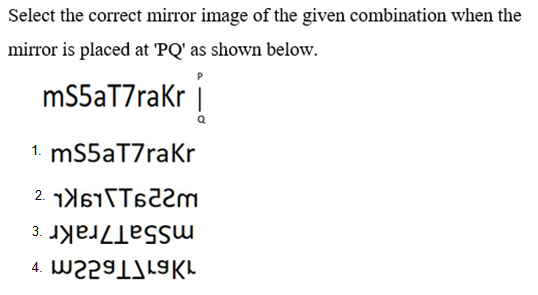Question
Statements: E > F = G; H < I = F; J > I
Conclusions: I) J > G II) E < J III) H > E In the following question assuming the given statements to be true, find which of the option among the given options is/are definitely true and then give your answers accordingly.Solution
I) J > G → True (as J > I = F = G → thus we can conclude that J > G) II) E < J → False (as E > F = G = I > H; J > I = F = G → J > F = G = I > H; E > F but the clear relation between E and J cannot be determined) III) H > E → False (as E > F = G = I > H → H < E; thus, it is clear that the given conclusion is incorrect.) Hence conclusion I is correct.
Select the option that is related to the fifth letter-cluster in the same way as the second letter-cluster is related to the first letter-cluster and th...

How many right angled triangles can be made from the given shape?
Which of the following letter-clusters should replace # and % so that the pattern and relationship followed between the letter-cluster pair on the left...
Select the figure from among the given options that can replace the question mark (?) in the following series.
V, W, X, Y and Z are five friends. V, X and Z are fond of Mango. W, X and Y like Apple. V, W and Z like Guava. W, X and Z like Banana. V and Y are fond...
Select the letter-cluster from among the given options that can replace the question mark (?) in the following series.
AURT, BWSV, CYTX, ?
Select the option that is related to the fifth letter-cluster in the same way as the second letter-cluster is related to the first lettter-
clu...
Read the given statements and conclusions carefully. Assuming that the information given in the statements is true, even if it appears to be at variance...
In a row of people all facing north, Prince is 5th from the right end. Amit is 15th from the right end. Amit is exactly between Prince and Aditya. If Ad...
Relevant for Exams:



